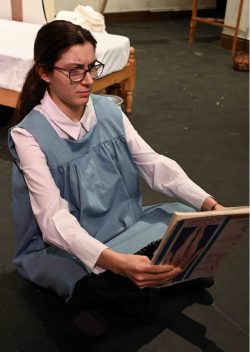
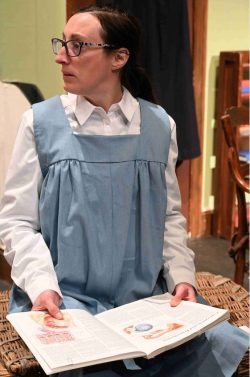 IN the years since Amanda Whittington’s play Be My Baby was first seen in Salisbury in 2004, there has been growing awareness of the misery and trauma caused to mothers and children by the estimated 215,000 “forced adoptions” over 30 years after the Second World War, and the increased popularity of TV shows and DNA sites has led to open and shame-free explorations of genetic histories. There are calls for a state apology for the policies that led to women and their babies being separated forever.
IN the years since Amanda Whittington’s play Be My Baby was first seen in Salisbury in 2004, there has been growing awareness of the misery and trauma caused to mothers and children by the estimated 215,000 “forced adoptions” over 30 years after the Second World War, and the increased popularity of TV shows and DNA sites has led to open and shame-free explorations of genetic histories. There are calls for a state apology for the policies that led to women and their babies being separated forever.
The Salisbury Studio Theatre production of the play, on until Saturday, starts with the screening of The Removed, a short film by Rebecca Rose. Starring Call the Midwife’s Georgie Glen, it is the story of a woman whose son was taken from her at his birth, searching for traces of him in the woods where she played as a child. It is profoundly moving and is the perfect introduction to the play, which is set in a Church of England mother-and-baby home in 1964.
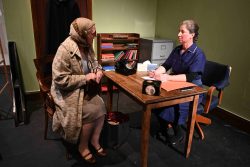 Sarah Derry plays Mary, a well brought up only child of older parents, pregnant by her medical student boyfriend. Determined not to let “Dad” know, her mother (Claire Martin) pretends Mary has gone to help an injured aunt, and takes her to St Saviour’s home, ruled by a no-nonsense matron ( Nikki Shepherd). There Mary meets the worldly wise Queenie (Clare Green), the innocent and childish Dol (Lynnette Barnes) and the doting and confused Norma (George Cotterill). They take what pleasure they can, while doing seemingly endless laundry, by “being up the duff together”, and to a soundtrack of 60s hits, all promising sentimental, faithful and romantic love.
Sarah Derry plays Mary, a well brought up only child of older parents, pregnant by her medical student boyfriend. Determined not to let “Dad” know, her mother (Claire Martin) pretends Mary has gone to help an injured aunt, and takes her to St Saviour’s home, ruled by a no-nonsense matron ( Nikki Shepherd). There Mary meets the worldly wise Queenie (Clare Green), the innocent and childish Dol (Lynnette Barnes) and the doting and confused Norma (George Cotterill). They take what pleasure they can, while doing seemingly endless laundry, by “being up the duff together”, and to a soundtrack of 60s hits, all promising sentimental, faithful and romantic love.
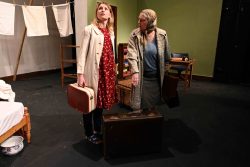 It is hard in 2025 for younger members of the audience to imagine the anguish and shame that accompanied illegitimate birth, as recently as the 1970s, when a “single parent” was a very unusual creature, and one to be pitied and scorned.
It is hard in 2025 for younger members of the audience to imagine the anguish and shame that accompanied illegitimate birth, as recently as the 1970s, when a “single parent” was a very unusual creature, and one to be pitied and scorned.
Sophie Townsend makes her directing debut with Whittington’s play, bringing out the humanity of the matron and perhaps altering the balance of the play, without the cruelty that often accompanies the authority figures in some similar stories – perhaps Call the Midwife has changed our perceptions, as long as we are not the people who lived through these personal, private sufferings.
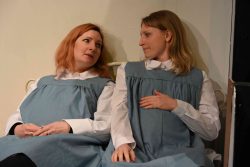 The playwright emphasises the youthful inexperience of her mothers-to-be, suddenly confronted with unwelcome, and apparently inescapable reality. That confusion and fear is particularly well characterised by Lynnette Barnes and George Cotterill, with Clare Green’s Queenie a recognisably big-hearted girl fated to always make the wrong choices. Sarah Derry’s Mary is determined, frustrated and unwilling to accept the reality of her situation, which is calmly and not-unkindly set out by the matron. Claire Martin’s Mrs Adams was just SO like the mothers of many of my school friends, scared of their husbands, their neighbours and their lives …. and just carrying on. It’s a very British play.
The playwright emphasises the youthful inexperience of her mothers-to-be, suddenly confronted with unwelcome, and apparently inescapable reality. That confusion and fear is particularly well characterised by Lynnette Barnes and George Cotterill, with Clare Green’s Queenie a recognisably big-hearted girl fated to always make the wrong choices. Sarah Derry’s Mary is determined, frustrated and unwilling to accept the reality of her situation, which is calmly and not-unkindly set out by the matron. Claire Martin’s Mrs Adams was just SO like the mothers of many of my school friends, scared of their husbands, their neighbours and their lives …. and just carrying on. It’s a very British play.
GP-W